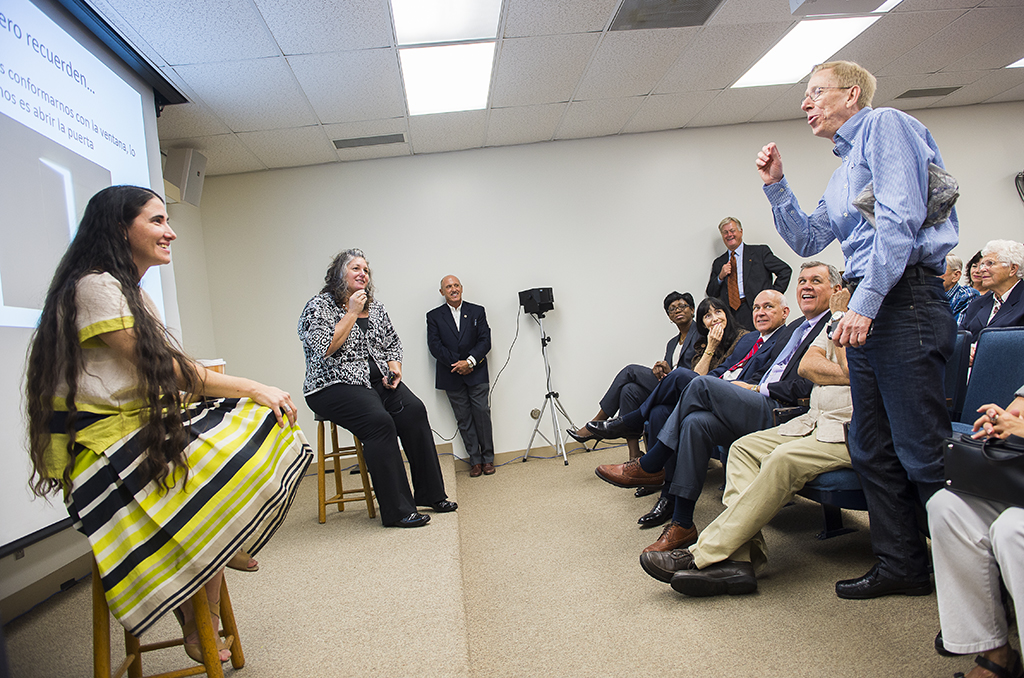Famed Cuban dissident Yoani Sánchez, whose commentaries on life in modern-day Cuba have made her an Internet sensation, says that technology is opening doors and minds in Cuba — and that access to the Internet could change the island’s future.
Sánchez, 38, whose blog, Generation Y (http://generacionyen.wordpress.com/ ), gets more than 15 million hits a month and is translated into 20 languages, spoke at Valencia College on Oct. 31.
Sánchez began writing her blog in 1994 when, during the depths of an economic crisis, she watched friends take the doors off their houses or the tops off tables to make rafts to flee the island. “In the midst of that,” she told an audience of more than 100 people who jammed the room, “it occurred to me to take to the computer.”
Thought it was impossible to buy a laptop in Cuba at the time, she cobbled together parts to make a computer (which she dubbed “my little Frankenstein”) and began writing. In the decade since, Sánchez has become one of the voices of dissent on the island of 11 million people — and in 2008, Time magazine named her one of the 100 most influential people in the world.
And though she’s well known outside of Cuba, many Cubans have never heard of her — because they don’t have access to the Internet.
The government still restricts access to the Internet and blocks many sites. But getting access to the Internet is difficult from a physical standpoint. There are only 118 Internet sites in the country and it costs $5 an hour to access the Internet, an astronomical sum to people who make $20 a month. Instead, she and her fellow dissidents have found creative ways to spread the news from the outside world — passing around flash drives full of information. In addition, many have taken to Twitter — the social media that helped fuel the Arab spring.
Today, Sánchez has more than 500,000 followers on Twitter.
“There are 150 people in Cuba who use Twitter. Compared to the number of Twitter followers in other countries, that’s nothing,” Sánchez said. “But the Cuban Twitter followers can tell their own opinions… and we have a diverse group of people telling their opinions: lawyers, people who are fighting racial discrimination and journalists who used to work with typewriters and tape recorders but are now using technology to help them spread their work.”
“Technology,” she added, “is opening windows when the doors are locked.”
Sánchez appeared at Valencia College as a guest of Valencia professor Richard Sansone, who met the activist on a trip to Cuba.
When the Cuban government granted her a passport earlier this year, Sánchez traveled around the world, speaking out in places from Miami to Prague. Over more than three months, she visited Brazil, Peru, Mexico, Spain, Italy, the Czech Republic, Poland, Sweden, Switzerland, Germany, Norway, Holland and the United States. On this trip, in addition to visiting Orlando, Sánchez met with a group in Miami, and toured Google and Twitter offices in San Francisco.
At her speech, she also encouraged young people to become active, both on social media and in person. In response to a Valencia student who said she was inspired to become a more active blogger, Sánchez offered this advice: “I would recommend that you not just hide behind Facebook. I tell you that from personal experience, because I also started out behind the keyboard… Don’t just be virtual citizens. Be real citizens.”
To read more about Sanchez’s visit to Valencia, please see the Orlando Sentinel article about her.

Comments are closed.